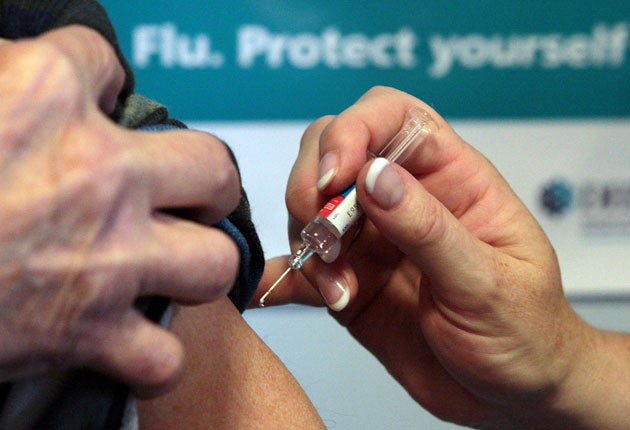Fewer pensioners and at-risk patients are receiving the flu jab than last year

Your support helps us to tell the story
From reproductive rights to climate change to Big Tech, The Independent is on the ground when the story is developing. Whether it's investigating the financials of Elon Musk's pro-Trump PAC or producing our latest documentary, 'The A Word', which shines a light on the American women fighting for reproductive rights, we know how important it is to parse out the facts from the messaging.
At such a critical moment in US history, we need reporters on the ground. Your donation allows us to keep sending journalists to speak to both sides of the story.
The Independent is trusted by Americans across the entire political spectrum. And unlike many other quality news outlets, we choose not to lock Americans out of our reporting and analysis with paywalls. We believe quality journalism should be available to everyone, paid for by those who can afford it.
Your support makes all the difference.With winter fast approaching, many people who risk becoming seriously ill if they get the flu have not yet been vaccinated against it.
The number of pensioners who have received the vaccination has fallen from the same period last year.
And the number of other "at risk" patients, who are under the age of 65 and suffer from various medical complications, has also decreased.
Figures show that by the end of last week, 48.9 per cent of patients aged 65 or older had the flu jab, but in the same week in 2011, 54.8 per cent of pensioners had received it.
Similarly, 28.7 per cent of patients with other medical complications, including asthma, heart disease, liver disease and diabetes, had been vaccinated by October 28, while at the same point in the previous year, 32.2 per cent of patients in England had already been given the jab, according to Department of Health figures.
For most people, flu is an unpleasant illness but it is not serious, but certain people are at greater risk of developing complications of flu, such as bronchitis and pneumonia.
Around 4,700 people die every year in England after getting flu, a Department of Health spokeswoman said.
People in at-risk groups are 11 times more likely to die than someone who is not in an at-risk group.
Health officials are launching a campaign to encourage at-risk groups to get vaccinated.
A new website, called Winterwatch, is also being launched later this month which will provide the latest winter-related health data.
Health Secretary Jeremy Hunt said: "Cold weather can be hazardous for our health - particularly for older people and those with respiratory illnesses.
"Each year, the cold weather is responsible for an increase in deaths and thousands of cases of flu, falls, heart attacks and strokes. In past years, these extra pressures have cost the NHS £42 million in emergency admissions alone.
"As winter approaches, we should all be on our guard against health problems - by taking simple steps and looking after our older friends and family we can keep warm and well."
Public Health Minister Anna Soubry said: "We have taken the decision this year to run a flu campaign because too many people in at-risk groups have not come forward for the jab yet, although local campaigns have been running for the past month.
"Our campaign aims to encourage people who are most at risk from flu, who have put it off or who don't think it is important, to get the vaccine."
David Salisbury, director of immunisation, said: "You are 11 times more likely to die from flu if you are pregnant or have a serious health condition and each year thousands of people die after catching flu.
"That's why we are reminding people who are particularly vulnerable to the consequences of flu to get the vaccine.
"Severe weather can be dangerous for vulnerable groups such as older people and those with serious illnesses. It's important for people to look after their health."
Clare Cox, spokeswoman for the British Lung Foundation, said: "Flu is unpleasant for anyone who catches it, but for particular at-risk groups, such as older people and those with respiratory conditions, the effects can be particularly serious.
"Getting vaccinated against flu can help protect against unnecessary illness and is free for these at-risk groups, so along with digging out your gloves and scarfs, we would strongly advise that people contact their GP about a flu vaccination as part of their normal preparations for winter."
The figures also show that the number of pregnant women who have received the jab so far this year has improved compared with the same timeframe in 2011.
Almost a quarter of pregnant women have been vaccinated this year compared with just 13.6% last year.
Louise Silverton, director for midwifery for the Royal College of Midwives, said: "Women must also be aware of the importance of having the seasonal flu vaccination as soon as they become pregnant.
"If any pregnant woman is unsure about this, I would urge them to speak to their midwife or doctor to discuss the issue.
"For women after their 28th week of pregnancy, they should ask for the pertussis (whooping cough) vaccination when they visit the GP."
PA
Join our commenting forum
Join thought-provoking conversations, follow other Independent readers and see their replies
Comments